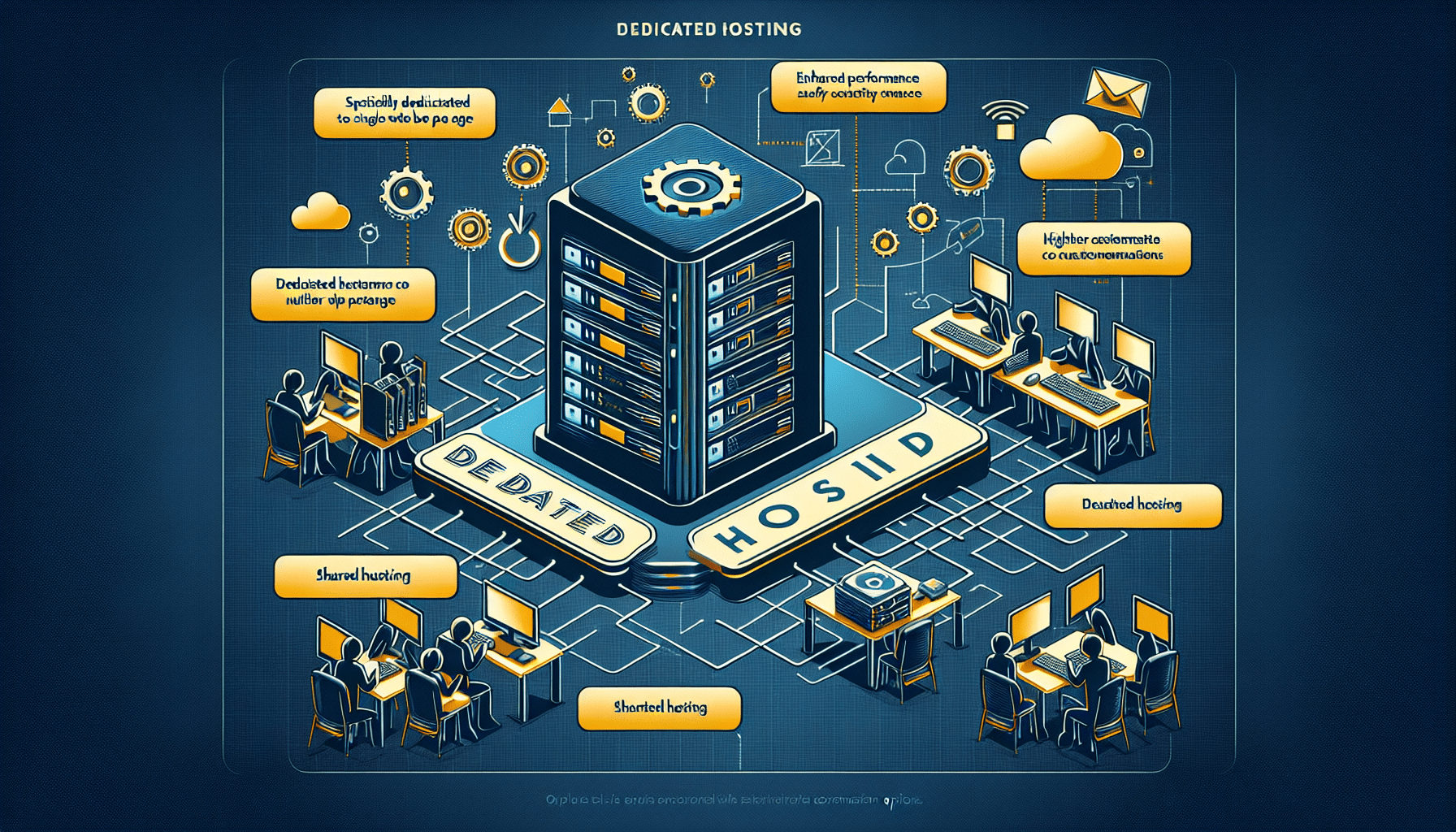So, you’ve finally decided to create your own website! Congratulations! Now, before you embark on this exciting journey, it’s important to understand the difference between website optimization and web hosting. While both play crucial roles in the success of your website, they serve different purposes. Website optimization focuses on improving the performance, speed, and overall user experience of your site, ensuring it is easily accessible and attractive to visitors. On the other hand, web hosting provides the foundation for your website, storing all of its data and making it accessible on the internet. By grasping the distinction between these two concepts, you’ll be well-equipped to make informed decisions when it comes to optimizing and hosting your website.
Website Optimization
What is website optimization?
Website optimization refers to the process of improving various aspects of a website to enhance its performance, user experience, and overall effectiveness. It involves implementing strategies and techniques to optimize website speed, responsiveness, content, and user experience, among others.
Why is website optimization important?
Website optimization is crucial for several reasons. Firstly, it improves the user experience by ensuring that the website loads quickly, is easy to navigate, and provides relevant and engaging content. This, in turn, increases user satisfaction and encourages them to spend more time on the site.
Secondly, website optimization plays a significant role in search engine optimization (SEO). By optimizing various elements of a website, such as content, meta tags, and URLs, it becomes more visible to search engines, leading to higher rankings in search results.
Lastly, website optimization can result in improved conversion rates and increased revenue. When a website is well-optimized, it is more likely to attract and retain visitors, who are more likely to convert into customers or take other desired actions, such as signing up for a newsletter or filling out a contact form.
Benefits of website optimization
There are numerous benefits to optimizing a website. Some of the key advantages include:
-
Improved website performance: A well-optimized website loads quickly and smoothly, reducing bounce rates and increasing user engagement.
-
Increased search engine visibility: By targeting keywords, optimizing content, and implementing other SEO techniques, website optimization improves a site’s chances of ranking higher in search engine results pages.
-
Enhanced user experience: Optimization techniques such as easy navigation, clear calls-to-action, and mobile responsiveness make it easier for users to browse the site and find what they’re looking for.
-
Higher conversion rates: When a website is optimized to meet the needs of its target audience, it becomes more effective in converting visitors into customers or achieving other desired goals.
-
Improved website credibility: A well-optimized website with high-quality content, fast load times, and secure browsing instills trust in visitors and enhances the credibility of the brand or business.
Common website optimization techniques
There are numerous techniques and strategies that can be implemented to optimize a website. Some common website optimization techniques include:
-
Optimizing website speed and performance: This involves minimizing page load times, optimizing images and scripts, and utilizing content delivery networks (CDNs) to improve the overall speed and performance of the website.
-
Improving website responsiveness: With the increasing use of mobile devices, it is crucial to optimize websites for different screen sizes and ensure smooth functionality across all devices.
-
Implementing effective SEO strategies: This includes optimizing meta tags, URLs, headings, and content with relevant keywords to improve search engine visibility and rankings.
-
Optimizing website content: By creating high-quality, engaging, and relevant content, websites can attract and retain visitors, increase user engagement, and improve search engine rankings.
-
User experience and usability enhancements: This involves improving website navigation, adding clear calls-to-action, ensuring easy access to contact information, and implementing other user-centric design elements to enhance the overall user experience.
Web Hosting
What is web hosting?
Web hosting refers to the process of storing and making websites accessible on the internet. It involves renting server space and resources from a web hosting provider to store website files, databases, and other necessary components.
Types of web hosting
There are several types of web hosting available, each catering to different website needs and requirements. The most common types of web hosting include:
-
Shared hosting: In shared hosting, multiple websites share the same server resources. It is a cost-effective option suitable for small to medium-sized websites with moderate traffic.
-
Virtual Private Server (VPS) hosting: VPS hosting involves dividing a physical server into multiple virtual servers, each with its own dedicated resources. It offers more control and flexibility compared to shared hosting and is suitable for websites that require more resources and scalability.
-
Dedicated hosting: With dedicated hosting, a website has an entire physical server dedicated solely to its needs. This provides maximum control, performance, and security, making it ideal for large websites with high traffic volume.
-
Cloud hosting: Cloud hosting involves hosting a website on a network of interconnected servers, distributing resources and ensuring high availability. It is scalable, reliable, and suitable for websites that experience unpredictable traffic fluctuations.
-
Managed hosting: Managed hosting includes a web hosting provider managing and maintaining the server and all related technical aspects on behalf of the website owner. It is ideal for those who do not have the technical expertise or time to manage their own servers.
Factors to consider when choosing a web hosting provider
When selecting a web hosting provider, several factors should be considered to ensure the best fit for your website’s needs. These factors include:
-
Reliability and uptime guarantee: Look for a provider that offers a high uptime guarantee, ensuring your website is accessible to visitors at all times.
-
Performance and speed: Choose a provider that offers fast server speeds and utilizes the latest technologies to optimize website performance.
-
Scalability and flexibility: Ensure that the hosting provider can accommodate the growth of your website and easily handle increased traffic and resource demands.
-
Customer support: Look for a provider that offers reliable and responsive customer support, available 24/7, to assist with any technical issues or concerns.
-
Security measures: Choose a hosting provider that implements robust security measures, including regular backups, firewall protection, and SSL certificates to ensure the safety of your website and visitors’ data.
Benefits of reliable web hosting
Utilizing reliable web hosting services offers several advantages for your website:
-
Consistent website availability: With reliable hosting, your website remains accessible to visitors without experiencing frequent downtime or server issues.
-
Improved website performance: A good hosting provider ensures fast load times and server response, enhancing user experience and reducing bounce rates.
-
Enhanced website security: Reliable hosting providers implement security measures to protect your website from cyber threats, ensuring the safety of your data and your visitors’ information.
-
Scalability and flexibility: With reliable web hosting, you have the flexibility to easily scale your website as it grows, accommodating increased traffic and resource demands.
-
Technical support: Reputable hosting providers offer reliable customer support, assisting you with any technical issues or concerns that may arise.
Common web hosting issues
Despite the advantages of web hosting, there can be some common issues that website owners may encounter:
-
Downtime and server issues: Poorly managed hosting can result in frequent server downtime, making your website inaccessible to visitors.
-
Slow website speed: Inadequate server resources or improper server configurations can lead to slow website load times and poor user experience.
-
Lack of security: Inadequate security measures can leave your website vulnerable to hacking attempts and compromise the safety of your data and visitors’ information.
-
Insufficient customer support: Some hosting providers may lack responsive customer support, leaving website owners stranded when facing technical difficulties or other issues.
-
Limited scalability: Certain hosting plans may not allow for easy scalability, making it challenging to accommodate the growth of your website.
Differences between Website Optimization and Web Hosting
Definition
Website optimization focuses on improving various aspects of a website to enhance its performance, user experience, and search engine visibility. It involves implementing strategies and techniques to optimize website speed, responsiveness, content, and more.
On the other hand, web hosting refers to the process of storing and making websites accessible on the internet. It involves purchasing server space and resources from a web hosting provider to store website files and databases and make them accessible to visitors.
Focus and objectives
The focus of website optimization is to improve the overall effectiveness of a website by enhancing its performance, user experience, and search engine visibility. The objective is to attract more visitors, engage them, and convert them into customers or achieve other desired goals.
In contrast, the primary focus of web hosting is to provide a reliable and secure infrastructure for storing and serving website files to visitors. The objective is to ensure the accessibility and reliability of the website by maintaining server functionality and performance.
Scope of work
Website optimization encompasses various techniques and strategies that target different aspects of a website, including speed optimization, content optimization, user experience enhancements, and SEO. It involves continuous monitoring and analysis to identify areas for improvement and implementing changes accordingly.
On the other hand, web hosting primarily deals with the technical aspects of hosting websites, such as server maintenance, security, backups, and ensuring server performance and uptime. It involves managing server resources, maintaining hardware and software, and offering customer support related to hosting services.
Responsibilities
The responsibility for website optimization typically lies with the website owner or the marketing team. They are responsible for implementing optimization techniques, monitoring website performance, and making necessary updates and improvements based on data and user feedback.
In contrast, the responsibility for web hosting lies with the hosting provider. They are responsible for ensuring server uptime, maintaining server infrastructure, and providing technical support for hosting-related issues. The website owner is generally responsible for managing their website’s content and design within the hosting environment.
Impact on website performance
Website optimization directly impacts the overall performance of a website. By improving website speed, responsiveness, and user experience, it increases user satisfaction, engagement, and conversion rates. Moreover, optimization techniques enhance search engine visibility, resulting in higher organic traffic and improved search engine rankings.
Web hosting, on the other hand, indirectly affects website performance. The reliability, speed, and security of the hosting environment directly influence the accessibility, load times, and overall user experience of the website. A reliable hosting service with fast servers and robust security measures are essential for a website’s performance and success.
Cost implications
The cost implications for website optimization and web hosting can vary significantly.
Website optimization costs can vary depending on the complexity of the optimization techniques employed and the level of expertise required. It may involve hiring professionals or utilizing optimization tools and services. However, the return on investment can be substantial, as optimization leads to improved website performance and increased revenue potential.
Web hosting costs depend on several factors, including the type of hosting service chosen, the level of resources allocated, and any additional features or services provided by the hosting provider. The cost can range from affordable shared hosting plans to more expensive dedicated or managed hosting options. It is important to choose a hosting plan that meets the needs of the website while considering factors like reliability, performance, and scalability.
Website Optimization Best Practices
Optimizing website speed and performance
Website speed and performance play a crucial role in user satisfaction and search engine rankings. To optimize website speed and performance, you can:
- Minimize HTTP requests by combining and compressing files.
- Optimize images by compressing and resizing them.
- Enable browser caching to reduce repeat downloads.
- Use a content delivery network (CDN) to serve website files from servers closer to the user’s location.
- Minify and compress CSS and JavaScript files.
- Optimize database queries and eliminate unnecessary plugins or scripts.
- Regularly monitor and analyze website performance using tools like Google PageSpeed Insights or GTmetrix.
Improving website responsiveness
With the increasing use of mobile devices, it is crucial to optimize websites for different screen sizes and ensure a responsive design. To improve website responsiveness, consider:
- Implementing a mobile-responsive design that adjusts to different screen sizes.
- Using CSS media queries to customize the layout based on device characteristics.
- Optimizing touch-friendly navigation and buttons for mobile users.
- Testing the website on various devices and screen sizes to ensure consistent performance.
Implementing effective SEO strategies
Search engine optimization (SEO) is essential for improving a website’s visibility in search engine results. To implement effective SEO strategies, consider:
- Conducting thorough keyword research to identify relevant and high-performing keywords.
- Optimizing meta tags, headings, and URLs with target keywords.
- Creating high-quality, informative, and keyword-rich content.
- Building high-quality backlinks from reputable websites.
- Ensuring proper website indexing and XML sitemap submission to search engines.
- Regularly monitoring and analyzing SEO performance using tools like Google Search Console or SEMrush.
Optimizing website content
Well-optimized website content is crucial for attracting and engaging visitors. To optimize website content, consider:
- Conducting keyword research and incorporating relevant keywords in the content.
- Ensuring content is well-structured with proper headings and subheadings.
- Using bullet points and numbered lists to improve readability.
- Including relevant and engaging visuals, such as images or videos.
- Regularly updating and refreshing content to keep it relevant and informative.
User experience and usability enhancements
Creating a positive user experience is key to retaining visitors and achieving desired goals. To enhance user experience and usability, consider:
- Ensuring easy and intuitive website navigation.
- Adding clear and prominent calls-to-action to guide users and encourage desired actions.
- Implementing user-friendly forms and minimizing form fields.
- Optimizing website accessibility for users with disabilities.
- Conducting user testing and gathering feedback to identify areas for improvement.
Web Hosting Best Practices
Choosing the right hosting plan for your website
When selecting a hosting plan, consider the specific needs of your website. Factors to consider include:
- The expected traffic volume and resource requirements of your website.
- The level of control and customization required.
- The scalability options and potential for future growth.
- Any specific software or programming language requirements.
- The availability and reliability of customer support.
Optimizing server performance
To optimize server performance, consider the following best practices:
- Regularly update server software and applications to ensure optimal functionality and security.
- Monitor server performance and resource usage to identify and address any bottlenecks.
- Optimize server configurations to maximize efficiency and speed.
- Use caching mechanisms, such as Memcached or Redis, to reduce server load and improve response times.
- Utilize a content delivery network (CDN) to distribute website files and reduce server load.
Ensuring website security
Website security is of utmost importance to protect your data and the privacy of your visitors. Implement the following security measures:
- Regularly update and patch server software and applications to prevent vulnerabilities.
- Utilize a robust firewall and intrusion detection system to safeguard against unauthorized access.
- Implement SSL certificates to encrypt data and ensure secure browsing.
- Perform regular security audits and vulnerability scans.
- Backup your website regularly to ensure data recovery in case of any security incidents.
Regular backups and disaster recovery
Backups are essential to protect your website from data loss due to server failures, hacking attempts, or other unforeseen events. To ensure regular backups and disaster recovery, consider:
- Implementing automated, regular backup solutions that store backups offsite.
- Testing the reliability and integrity of backup files.
- Developing a disaster recovery plan outlining steps to be taken in the event of a data loss or server failure.
Scalability and flexibility
Choose a hosting provider that offers scalability and flexibility to accommodate your website’s growth. Consider the following:
- Opt for hosting plans that allow for easy upgrade or downgrade options.
- Ensure the hosting provider offers additional resources as your website’s needs increase.
- Consider cloud hosting options that provide scalability and high availability.
Website Optimization Tools
Google PageSpeed Insights
Google PageSpeed Insights is a free tool that measures website performance and provides suggestions for improvement. It analyzes website speed and offers recommendations to optimize performance on both desktop and mobile devices.
GTmetrix
GTmetrix is another popular website optimization tool that analyzes website speed and performance. It provides a detailed report with suggestions for improvement, including optimizing images, scripts, and other website elements.
Pingdom Website Speed Test
Pingdom Website Speed Test is a tool that analyzes website speed and provides detailed performance insights. It enables you to monitor website uptime and performance over time, highlighting areas that need attention.
Keyword research tools
Keyword research tools, such as Google Keyword Planner or SEMrush, assist in identifying relevant keywords with high search volume and low competition. These tools provide insights into keyword performance, allowing you to optimize content and improve search engine visibility.
User behavior analytics tools
User behavior analytics tools, such as Google Analytics or Hotjar, provide valuable insights into how users interact with your website. They help identify areas for improvement by tracking user behavior, heat maps, click-through rates, conversion rates, and other metrics.
Web Hosting Providers
Bluehost
Bluehost is a popular web hosting provider known for its reliability and beginner-friendly features. It offers a range of hosting plans, including shared hosting, VPS hosting, and dedicated hosting, along with a user-friendly control panel and excellent customer support.
HostGator
HostGator is another well-known hosting provider offering a wide range of hosting solutions, including shared hosting, VPS hosting, and dedicated hosting. It provides easy-to-use tools and a robust infrastructure, along with reliable customer support.
SiteGround
SiteGround is a reputable hosting provider known for its reliability, performance, and top-notch customer support. It offers various hosting options, including shared hosting, managed WordPress hosting, and cloud hosting, with advanced security features and high uptime guarantee.
DreamHost
DreamHost is a reliable hosting provider offering shared hosting, VPS hosting, and dedicated hosting solutions. It focuses on providing fast and reliable hosting services with advanced security measures, unlimited bandwidth, and excellent customer support.
GoDaddy
GoDaddy is a well-known hosting provider offering various hosting plans, including shared hosting, VPS hosting, and dedicated hosting. It provides a user-friendly interface, affordable pricing plans, and a range of additional services such as domain registration and website builder tools.
Website Optimization Case Studies
Optimizing load time for an e-commerce website
An e-commerce website wanted to improve its load times to enhance the user experience and increase conversions. By optimizing image sizes, minifying CSS and JavaScript files, and implementing caching mechanisms, they reduced their site’s load time by 30%. This resulted in a 20% increase in conversions and improved search engine rankings.
Increasing conversion rates through A/B testing
A blog wanted to improve its conversion rates for newsletter sign-ups. Using A/B testing, they tested different call-to-action placements, colors, and copy variations. By analyzing user behavior and engagement metrics, they identified the winning variation that increased their conversion rate by 15%.
Improving search engine rankings for a blog
A blog wanted to improve its search engine visibility and organic traffic. By conducting thorough keyword research, optimizing meta tags and content, and building high-quality backlinks, they saw a significant increase in their search engine rankings. As a result, their organic traffic grew by 40% within six months.
Web Hosting Comparison
Shared hosting vs. VPS hosting
Shared hosting involves multiple websites sharing the same server resources. It is an affordable option suitable for small to medium-sized websites. VPS hosting, on the other hand, offers more control and dedicated resources to each website, making it ideal for larger websites with higher resource demands.
Managed hosting vs. unmanaged hosting
Managed hosting involves the hosting provider managing and maintaining the server and all technical aspects on behalf of the website owner. Unmanaged hosting, on the other hand, requires the website owner to handle all server management tasks. Managed hosting is suitable for those who prefer a hands-off approach or lack the technical expertise.
Cloud hosting vs. dedicated hosting
Cloud hosting utilizes a network of interconnected servers to provide high availability and scalability. It is suitable for websites that experience unpredictable traffic fluctuations. Dedicated hosting offers the entire physical server dedicated solely to one website, providing maximum control, performance, and security.
Free hosting vs. paid hosting
Free hosting services are often limited in terms of resources, performance, and support. They are suitable for personal or small projects with low resource requirements. Paid hosting offers more features, resources, and support, making it ideal for professional websites or businesses that require reliability and performance.
Factors to consider when comparing web hosting providers
When comparing web hosting providers, consider factors such as uptime guarantee, server performance and speed, scalability options, security measures, customer support quality, pricing, and reviews from existing customers. Assess your specific website needs and choose a provider that aligns with those requirements.
Conclusion
Website optimization and web hosting are two distinct aspects of creating and maintaining a successful website. Website optimization focuses on enhancing website performance, user experience, and search engine visibility. It involves techniques such as improving website speed, implementing effective SEO strategies, and optimizing content and user experience. On the other hand, web hosting involves storing and making website files accessible on the internet. It encompasses choosing a suitable hosting plan, ensuring server performance and security, and providing technical support.
Both website optimization and web hosting are crucial for the success of a website. By implementing best practices in both areas, you can create a highly optimized and reliable website that attracts visitors, engages them, and achieves your desired goals. Whether optimizing website speed or choosing a dependable hosting provider, be sure to prioritize the needs and expectations of your target audience to ensure a positive user experience and maximize the potential of your website.












